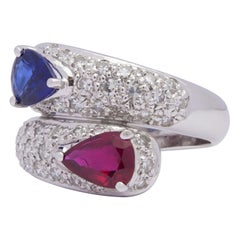Pear Shape Twisted Shank Ruby Ring
20th Century American Modernist Cluster Rings
Sapphire, Ruby, Diamond, White Gold, 18k Gold, Gold
People Also Browsed
20th Century Dome Rings
Diamond, Yellow Gold, Gold, 18k Gold
20th Century Dome Rings
Diamond, Yellow Gold, Gold, 14k Gold
2010s American Contemporary Band Rings
Diamond, 18k Gold, Yellow Gold
20th Century Dome Rings
Diamond, Yellow Gold, Gold, 18k Gold
2010s American Cocktail Rings
Diamond, Emerald, Ruby, 18k Gold, Yellow Gold, Gold
Mid-20th Century European Art Deco Cocktail Rings
Ruby, Sapphire, Emerald, Diamond, Yellow Gold, 18k Gold
21st Century and Contemporary Three-Stone Rings
Blue Diamond
21st Century and Contemporary Japanese Modern Cocktail Rings
Ruby, Diamond, Platinum
2010s Contemporary Cocktail Rings
Diamond, Opal, Black Opal, White Gold
Late 20th Century Italian Contemporary Cocktail Rings
Sapphire, Diamond, Yellow Gold, 18k Gold, Gold
2010s American Contemporary Dome Rings
Diamond, Ruby, 18k Gold, White Gold
20th Century American Modern Fashion Rings
Coral, 18k Gold, Yellow Gold, Platinum
Vintage 1980s American Modernist Cocktail Rings
Pearl, White Diamond, Diamond, Platinum, Yellow Gold, 18k Gold, Gold
21st Century and Contemporary American Contemporary Fashion Rings
Black Opal, Opal, Yellow Diamond, Yellow Gold, Platinum, 18k Gold
20th Century American Modern Cocktail Rings
Coral, Jade, 18k Gold, Yellow Gold, Platinum, Enamel
21st Century and Contemporary Contemporary Cocktail Rings
Diamond, Sapphire, 18k Gold, White Gold
The Legacy of Diamond in Jewelry Design
Antique diamond rings, diamond tiaras and dazzling vintage diamond earrings are on the wish lists of every lover of fine jewelry. And diamonds and diamond jewelry are primarily associated with storybook engagements and red-carpet grand entrances — indeed, this ultra-cherished gemstone has a dramatic history on its hands.
From “A Diamond Is Forever” to “Diamonds Are a Girl’s Best Friend,” pop culture has ingrained in our minds that diamonds are the most desired, the most lasting and the most valuable gemstone. But what makes the diamond so special? Each stone — whether it’s rubies, sapphires or another stone — is unique and important in its own right. April babies might claim diamonds for themselves, but just about everyone wants this kind of sparkle in their lives!
There are several factors that set diamonds apart from other stones, and these points are important to our gem education.
Diamonds are minerals. They are made up of almost entirely of carbon (carbon comprises 99.95 percent; the remainder consists of various trace elements). Diamonds are the hardest gemstones, ranking number 10 on the Mohs Hardness Scale. Even its name, diamond, is rooted in the Greek adamas, or unconquerable. The only object that can scratch a diamond is another diamond. Diamonds are formed deep within the earth at very high temperatures (1,652–2,372 degrees Fahrenheit at depths between 90 and 120 miles beneath the earth’s surface) and are carried up by volcanic activity. Diamonds are quite rare, according to the Gemological Institute of America, and only 30 percent of all the diamonds mined in the world are gem quality.
In the 1950s, the Gemological Institute of America developed the 4Cs grading system to classify diamonds: clarity, color, cut and carat weight. Not all diamonds are created equal (there are diamonds, and then there are diamonds). The value of the diamond depends on the clarity (flawless diamonds are very rare but a diamond's value decreases if there are many blemishes or inclusions), color (the less color the higher the grade), cut (how the diamond’s facets catch the light, certain cuts of diamonds show off the stone better than others) and carat weight (the bigger, the better).
When you start shopping for a diamond engagement ring, always prioritize the cut, which plays the largest role in the diamond's beauty (taking the time to clean your diamond ring at least every six months or so plays a role in maintaining said beauty). And on 1stDibs, a range of buying guides can be found for those in the market for antique engagement rings, vintage engagement rings or Art Deco engagement rings.
Shop antique and vintage diamond rings, diamond necklaces and other extraordinary diamond jewelry on 1stDibs.
Finding the Right Cluster-rings for You
Antique and vintage cluster rings are timeless accessories. While they might have been considered more popular in certain eras than in others, they’re versatile and belong in any jewelry box.
Featuring a diamond or other central gemstone surrounded by smaller stones, the cluster rings’ distinguished look makes them a popular choice for engagement rings or, for a fancy night out, an accent piece for jewelry lovers everywhere.
The style of cluster rings has changed over time even if the defining attributes have remained intact.
Georgian-era jewelry — named for the monarchies of the four King Georges — features cluster rings that are often characterized by a grouping of central stones into rose-like shapes. (The stones are set off by the setting’s blackened metal.) Diamonds came into fashion during the late Victorian period, and late Victorian cluster rings were most often set in yellow gold. Jewelers of the Art Deco period embraced geometric shapes, and Art Deco cluster rings feature emeralds, sapphires and other colorful stones.
Cluster rings for future brides have been in and out of the spotlight, but cluster-style engagement rings have been experiencing a consistent revival of sorts since at least 2011, when Kate Middleton began wearing Princess Diana’s sapphire and diamond ring, which was made by Garrard in the 1980s. For your special day, whether you prefer vintage engagement rings or contemporary pieces, a cluster ring can deliver some sparkle if a diamond solitaire is out of your budget. (See our engagement ring buying guide for insight and expert tips to help you find the perfect ring.)
On 1stDibs, find many ruby cluster rings, gold cluster rings and an extraordinary range of other antique and vintage rings today.
